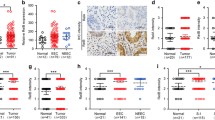Abstract
The progression of breast cancer cells to estrogen-independent growth may be accompanied with the paradoxical cell sensitization to estrogen apoptotic action; however, the mechanism of this phenomenon is still unclear. In the present study, we have shown that the sensitization of hormone-resistant breast cancer cells to estrogen apoptotic action is accompanied with the gradual NF-κB suppression. Using the chemical inhibitors of NF-κB as well as the dominant-negative NF-κB constructs, we have proved the sufficiency of NF-κB inhibition for the sensitization of the resistant cells to estrogen apoptosis. Estradiol treatment results in the additional suppression of NF-κB, demonstrating the possible NF-κB involvement in the regulation of cell response to estrogens. Totally, the results presented suggest that the constitutive NF-κB suppression in the estrogen-independent cells may be considered as one of the factors resulting in a imbalance between pro- and anti-apoptotic pathways and enhancement in estrogen apoptotic action in the cells.




Similar content being viewed by others
References
Liu H, Lee ES, Gajdos C et al (2003) Apoptotic action of 17beta-estradiol in raloxifene-resistant MCF-7 cells in vitro and in vivo. J Natl Cancer Inst 95:1586–1597
Song RX, Mor G, Naftolin F et al (2001) Effect of long-term estrogen deprivation on apoptotic responses of breast cancer cells to 17beta-estradiol. J Natl Cancer Inst 93:1714–1723. doi:10.1093/jnci/93.22.1714
Song RX, Zhang Z, Mor G et al (2005) Down-regulation of Bcl-2 enhances estrogen apoptotic action in long-term estradiol-depleted ER(+) breast cancer cells. Apoptosis 10:667–678. doi:10.1007/s10495-005-1903-2
Scherbakov AM, Lobanova YS, Shatskaya VA et al (2006) Activation of mitogenic pathways and sensitization to estrogen-induced apoptosis: two independent characteristics of tamoxifen-resistant breast cancer cells? Breast Cancer Res Treat 100:1–11. doi:10.1007/s10549-005-9075-x
Song RX, Santen RJ (2003) Apoptotic action of estrogen. Apoptosis 8:55–60. doi:10.1023/A:1021649019025
Lewis JS, Osipo C, Meeke K et al (2005) Estrogen-induced apoptosis in a breast cancer model resistant to long-term estrogen withdrawal. J Steroid Biochem Mol Biol 94:131–141. doi:10.1016/j.jsbmb.2004.12.032
Lonning PE, Taylor PD, Anker G et al (2001) High-dose estrogen treatment in postmenopausal breast cancer patients heavily exposed to endocrine therapy. Breast Cancer Res Treat 67:111–116. doi:10.1023/A:1010619225209
Ingle JN (2002) Estrogen as therapy for breast cancer. Breast Cancer Res 4:133–136. doi:10.1186/bcr436
Lobanova YS, Scherbakov AM, Shatskaya VA et al (2007) Mechanism of estrogen-induced apoptosis in breast cancer cells: role of the NF-kappaB signaling pathway. Biochemistry (Mosc) 72:320–327. doi:10.1134/S0006297907030108
Provost PR, Blomquist CH, Godin C et al (2000) Androgen formation and metabolism in the pulmonary epithelial cell line A549: expression of 17beta-hydroxysteroid dehydrogenase type 5 and 3alpha-hydroxysteroid dehydrogenase type 3. Endocrinology 141:2786–2794. doi:10.1210/en.141.8.2786
Krasil’nikov MA, Shatskaya VA, Stavrovskaya AA et al (1999) The role of phosphatidylinositol 3-kinase in the regulation of cell response to steroid hormones. Biochim Biophys Acta 1450:434–443. doi:10.1016/S0167-4889(99)00066-X
Reid G, Hubner MR, Metivier R et al (2003) Cyclic, proteasome-mediated turnover of unliganded and liganded ERalpha on responsive promoters is an integral feature of estrogen signaling. Mol Cell 11:695–707. doi:10.1016/S1097-2765(03)00090-X
Gasparian AV, Yao YJ, Kowalczyk D et al (2002) The role of IKK in constitutive activation of NF-kappaB transcription factor in prostate carcinoma cells. J Cell Sci 115:141–151
Hotz MA, Gong J, Traganos F et al (1994) Flow cytometric detection of apoptosis: comparison of the assays of in situ DNA degradation and chromatin changes. Cytometry 15:237–244. doi:10.1002/cyto.990150309
Planas-Silva MD, Waltz PK, Kilker RL (2006) Estrogen induces death of tamoxifen-resistant MCF-7 cells: contrasting effect of the estrogen receptor downregulator fulvestrant. J Steroid Biochem Mol Biol 98:193–198. doi:10.1016/j.jsbmb.2005.10.003
Santen RJ (2007) The oestrogen paradox: a hypothesis. Endokrynol Pol 58:222–227
Chisamore MJ, Ahmed Y, Bentrem DJ et al (2001) Novel antitumor effect of estradiol in athymic mice injected with a T47D breast cancer cell line overexpressing protein kinase Calpha. Clin Cancer Res 7:3156–3165
Schafer JM, Jordan VC (2006) Models of hormone resistance in vitro and in vivo. Methods Mol Med 120:453–464
Acknowledgments
This work was supported in part by the Russian Foundation for Basic Research (www.rfbr.ru), grant 07-04-00573. We thank Olga Burova (Russian N.N. Blokhin Cancer Research Centre, Moscow, Russia) for assistance in FACS analysis.
Author information
Authors and Affiliations
Corresponding author
Rights and permissions
About this article
Cite this article
Lobanova, Y.S., Scherbakov, A.M., Shatskaya, V.A. et al. NF-κB suppression provokes the sensitization of hormone-resistant breast cancer cells to estrogen apoptosis. Mol Cell Biochem 324, 65–71 (2009). https://doi.org/10.1007/s11010-008-9985-0
Received:
Accepted:
Published:
Issue Date:
DOI: https://doi.org/10.1007/s11010-008-9985-0




